Abraham and Isaac
The following is an intentionally garbled version of an otherwise familiar Bible story. Consider what difference it would have made if this fictitious version had been the real one:
And it came to pass after these things, that God did tempt Abraham, and said unto him, Abraham: and he said, Behold here I am.
And he said, Take now thy son, thine only son Isaac, whom thou lovest, and get thee into the land of Moriah; and offer him there for a burnt offering upon one of the mountains which I will tell thee of.
However, I know that if thou shouldst do this, it would cause thee great grief. Therefore, fear not. In the moment that thou shalt raise the knife to slay thy son, I will send an angel to restrain thee. And I will provide a ram caught in a thicket by his horns. It shalt thou sacrifice instead of thy son, and thou shalt bring thy son safely once again unto his mother. (Adapted from Genesis 22.)
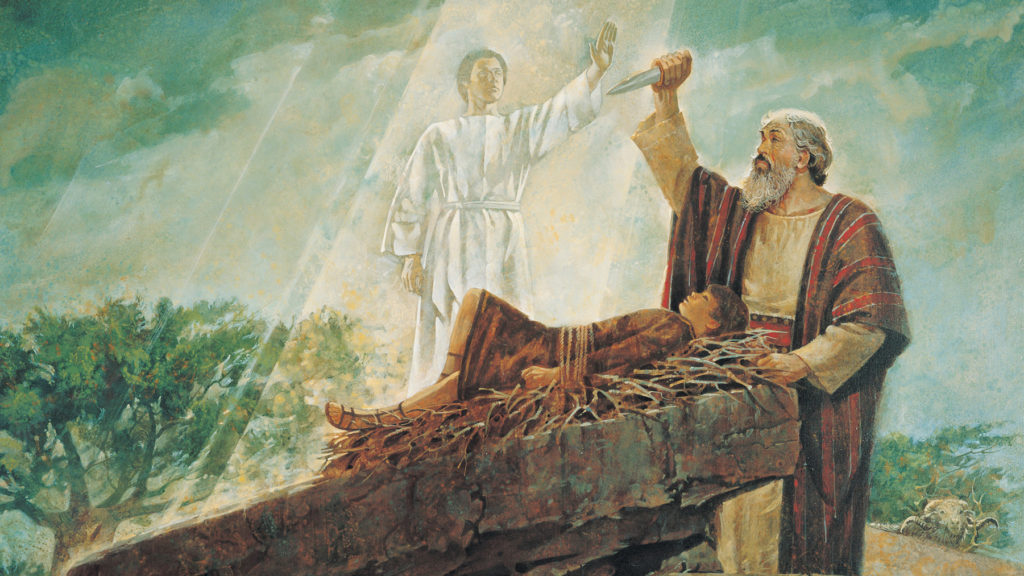
Lehi’s departure from Jerusalem
Most readers of this post will readily see why the Lord didn’t do it that way with Abraham and Isaac. If not, maybe this will help: What is wrong with the following account of the prophet Lehi’s departure from Jerusalem?
And it came to pass that the Lord commanded my father, even in a dream, that he should take his family and depart into the wilderness.
And the Lord said unto him: Behold, I will lead thee safely across the wilderness and across the many waters to a land choice above all other lands. There shalt thou and thy posterity prosper and escape from the destruction which awaits those who remain in Jerusalem.
And it came to pass that he was obedient unto the word of the Lord, wherefore he did as the Lord commanded him. (Loosely based on 1 Nephi 2.)
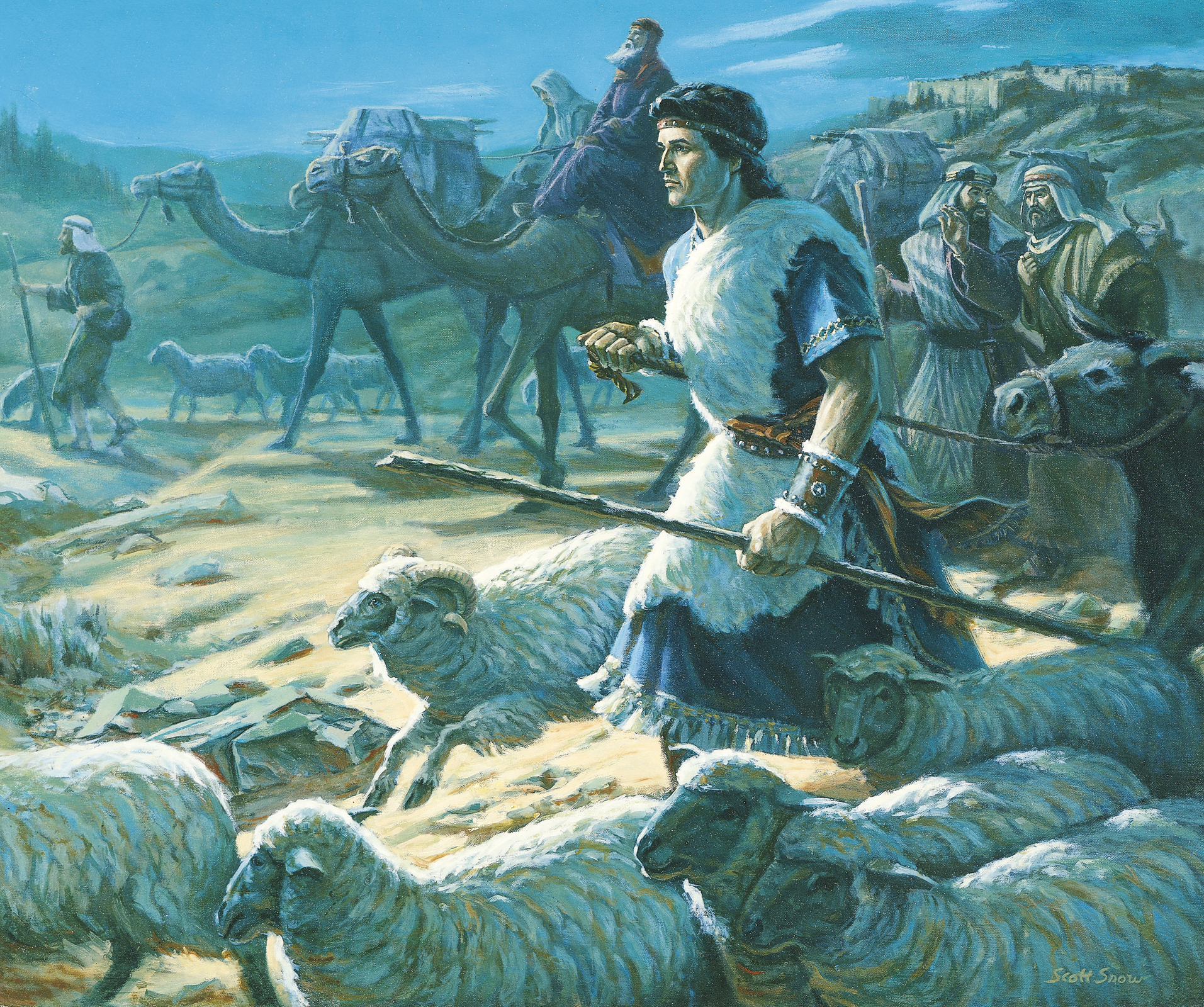
For his obedience to God, we have known Abraham ever since as “the father of the faithful.” After he passed the test, God promised him an endless posterity, as numerous as the sands of the sea or the stars of heaven. But what would Abraham have deserved had he known in advance that he wouldn’t really have to go through with the sacrifice? What kind of spiritual growth would he have made? Had not Abraham proceeded with faith and made every preparation to go through with the commanded sacrifice, we would certainly not be reading about him in the Bible.
Likewise, the real version of Lehi’s departure from Jerusalem confirms that when he first obeyed God’s command to leave behind his gold and silver and comfortable home, he had no idea what lay ahead. The Lord initially told him nothing about a promised land. It was only after he was in the wilderness that the Lord added the “P.S.” Only then could He tell him about the land choice above all others to which He would lead him.
Crossing the Jordan
When the Israelites were preparing to enter the Promised Land, they came upon a physical barrier. The river Jordan was at flood stage. Most Israelites had probably never learned to swim. Nor could they get their children, animals, and baggage across the water. They could have sat down and said, “Lord, we can’t do it. But if thou wilt first stop the flow and dry out the river bed, we’ll consider trying to cross.” Had they taken that position, their descendants would probably still be sitting there today. Instead, they went with faith to the river’s edge. The priests who were carrying the ark of the covenant dipped their toes into the water, prepared to go as far as they could. It was at that moment, not before, that “the waters which came down from above stood and rose up upon an heap very far from the city Adam … and all the Israelites passed over on dry ground.” (Joshua 3:16-17.)
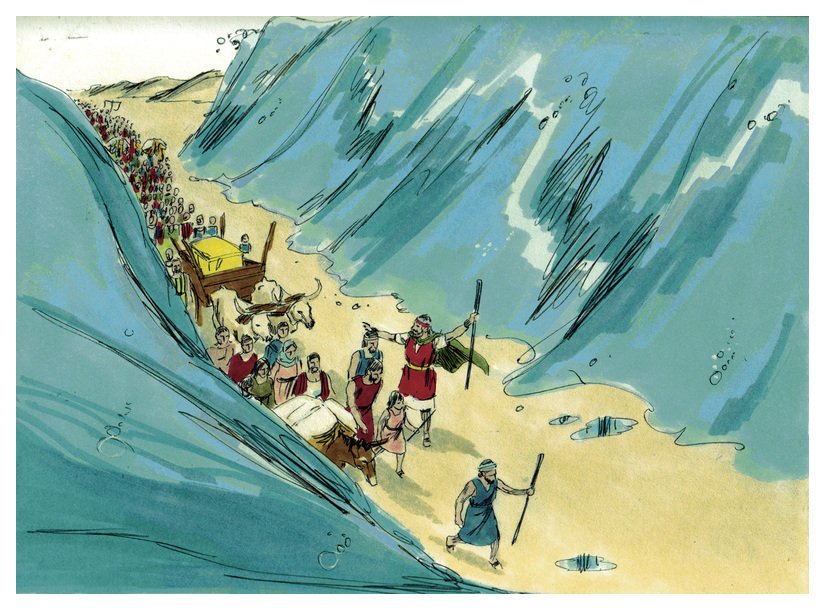
The “After You” principle
As he abridged the story of the Jaredites, the prophet Moroni taught: “Dispute not because ye see not, for ye receive no witness until after the trial of your faith.” (Ether 12:6.) In other words, it is contrary to God’s plan for our growth and happiness to let us see ahead of time how things are going to work out if we obey Him. But He promises that if we will take the first step rather than insist on His taking it, we will see miracles. Abraham would have missed the miracle had he refused to take Isaac to Mount Moriah. But he would also have missed it had he known in advance how the story would turn out. So would Lehi, had he known better things were ahead when he first left Jerusalem. The same would have been true for the Israelites had the Lord provided a bridge already built for them at the Jordan when they arrived.
Trying to hammer home this principle, Moroni gave additional examples of the “after you” principle. He wrote:
And it was by faith that the three disciples obtained a promise that they should not taste of death; and they obtained not the promise until after their faith.
And neither at any time hath any wrought miracles until after their faith; wherefore they first believed in the Son of God.
And if men come unto me I will show unto them their weakness. I give unto men weakness that they may be humble; and my grace is sufficient for all men that humble themselves before me; for if they humble themselves before me, and have faith in me, then will I make weak things become strong unto them.
For the brother of Jared said unto the mountain Zerin, Remove—and it was removed. And if he had not had faith it would not have moved; wherefore thou workest after men have faith.
For thus didst thou manifest thyself unto thy disciples; for after they had faith, and did speak in thy name, thou didst show thyself unto them in great power.
(Ether 12:17, 18, 27, 30, 31.)
Signs follow belief
Jesus likewise taught that “signs follow them that believe.” True faith seldom starts with seeing a miracle or sign. But once one has decided to trust (have faith in) God, he will find constant little miracles in his life, assuring him that he is on the right path, and that God does indeed love him.

Courtesy dictates that normally one let another go through a door first. Or take the first piece of pie. Or have the first turn in a game. But when dealing with God, it is essential that we be willing to make the first move.

Modern applications
Tithing
A misunderstanding of this principle has kept too many otherwise good people out of the Church. It has kept countless other Church members from qualifying for a temple recommend. One of the requirements for baptism or for entering the temple is payment of a full tithing—10% of one’s income. But God in His wisdom has ensured that virtually no one will have a 10% surplus each month. So, tithing becomes not only a test of one’s faith but a builder of that faith. The faithless will add up their current income, compare it to their current monthly bills and living expenses, and conclude that payment of tithing is simply impossible.
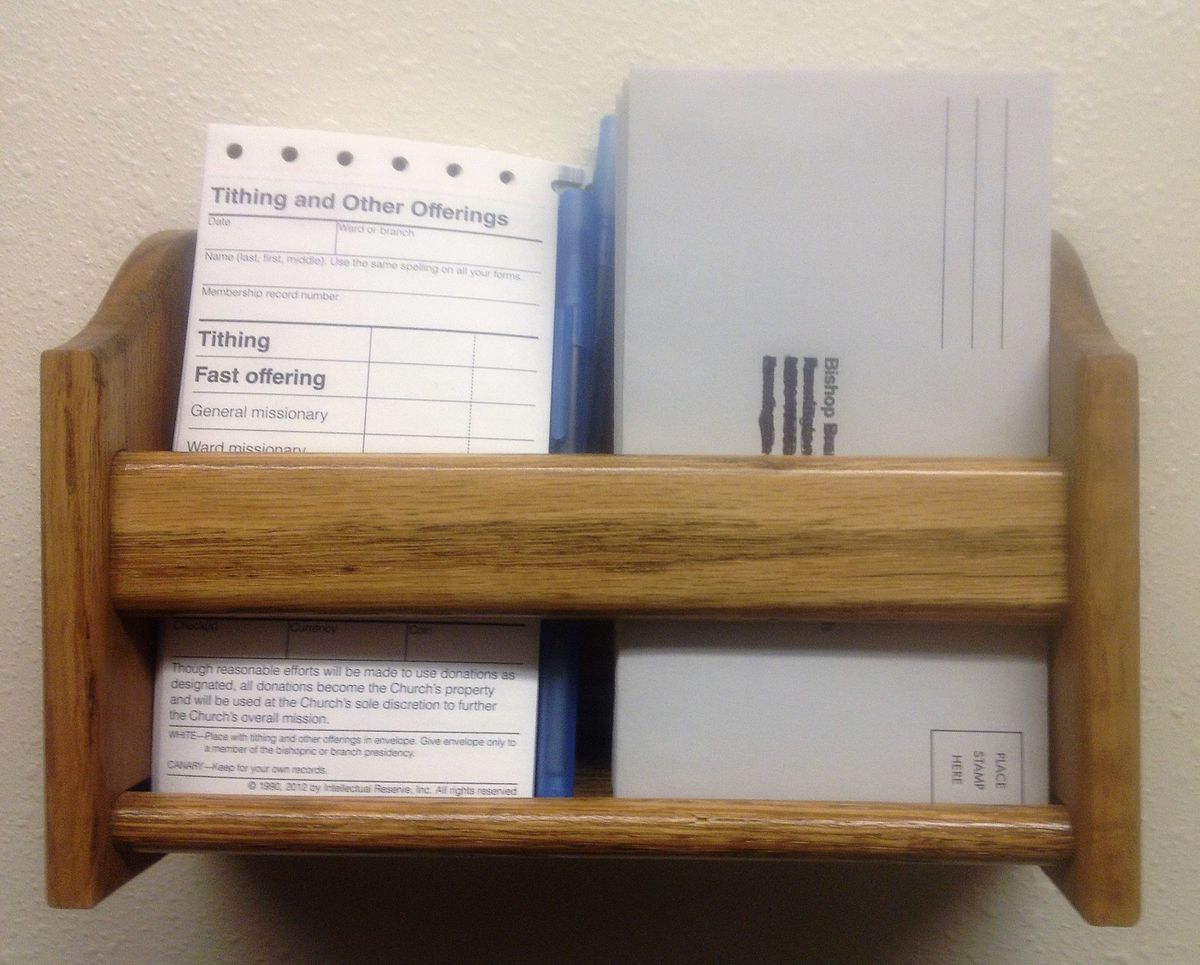
The faithful may well make the same analysis of income and expenses. But they will then say, “I don’t know how this is going to work out, but I know enough of God’s goodness and love to trust Him. He promises to open the windows of heaven to those who are faithful tithe-payers. I’m going to put that promise to the test.” Such invariably find that somehow things do work out. Sometimes new opportunities arrive for increased income. More commonly, and less spectacularly, expenses may go down. Maybe the car doesn’t break down as often. Or the clothes last longer. Or one learns to budget and manage his resources more carefully. In a few cases, a member may even need to seek temporary help from the bishop to meet his needs. If he has faithfully paid his tithing and lived the other commandments, he is entitled to such help. If he has not, he is not so entitled.
Calls to serve
God’s children either receive or miss out on other blessings for the same reason. One may receive a call to teach a class of 14 and 15-year-olds but feel he just can’t do it. He has never taught and doesn’t even like teenagers. Another, with an equal lack of teaching experience and a similar aversion to that age group may accept the call. At that point, since the Lord gives no commandments without preparing the way for us to fulfill them (1 Nephi 3:7), He now has an obligation to help that teacher grow into the kind of teacher he needs to be. And in all probability, he will come to love teenagers.
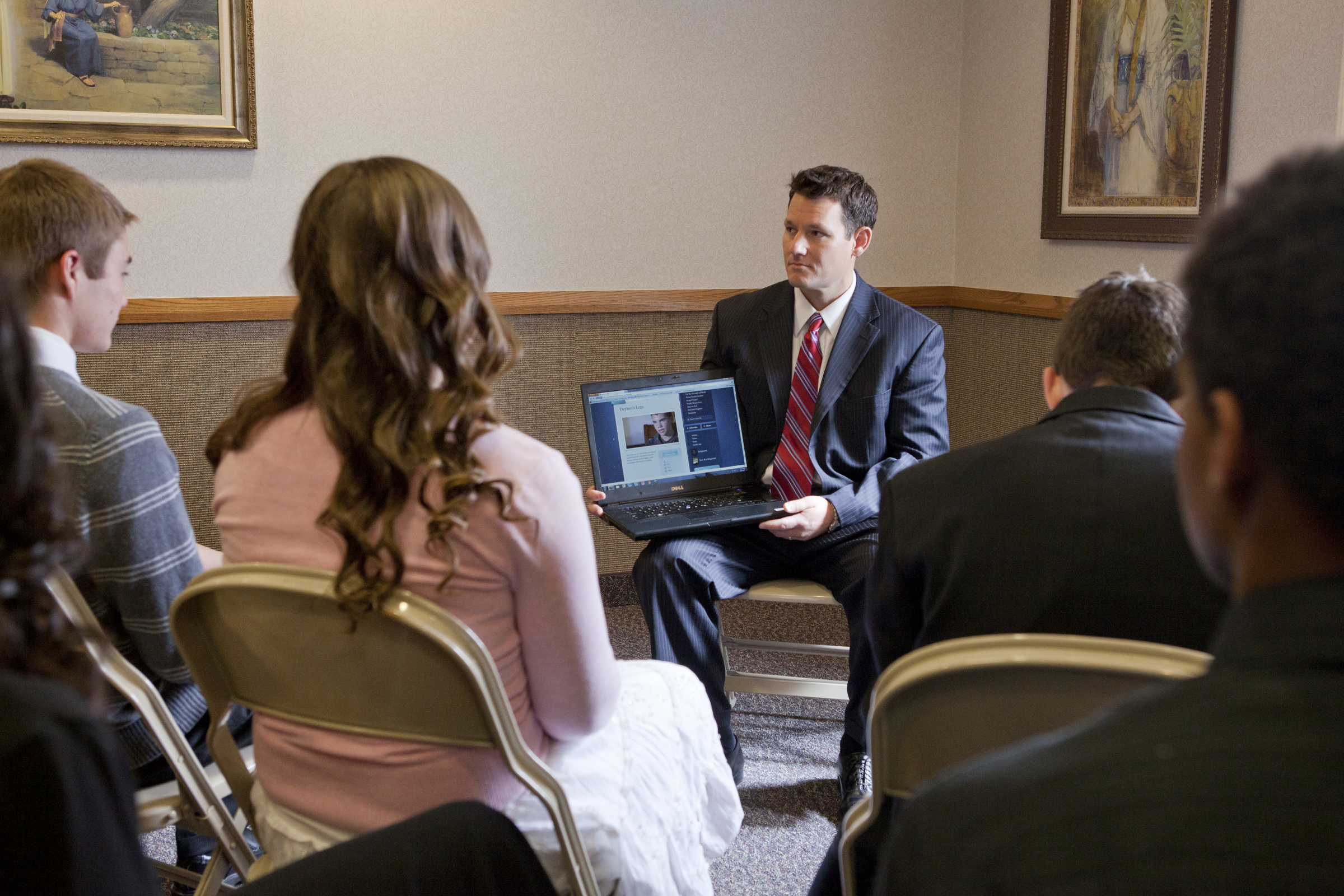
Some young adults try to avoid the bishop for fear he will encourage them to serve a mission. They are sure they could never talk to strangers, learn a foreign language, or be gone from family and friends for two years. Others, with similar concerns but greater faith accept the call. They find that with divine help they can indeed learn to love talking with strangers. The language they thought impossible will come. And homesickness will not be overwhelming after all.
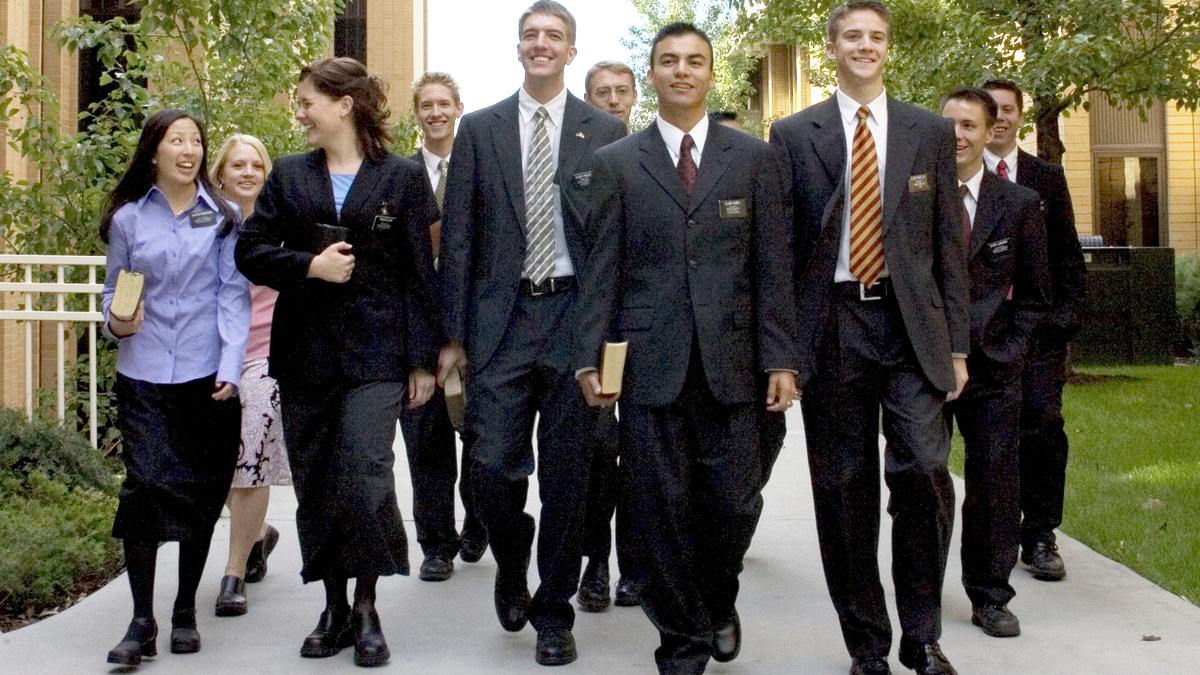
Family size
Some couples miss out on one of the great joys of life by needlessly limiting their children to one or two. They think they don’t have the resources or the emotional ability to handle more. They may well be right. Why would the Lord give them those resources or ability in advance? That would undermine His plan to strengthen the faith of His children. But many can testify that once they went ahead, trusting the Lord, they received increased strength and resources to handle and love the additional child.
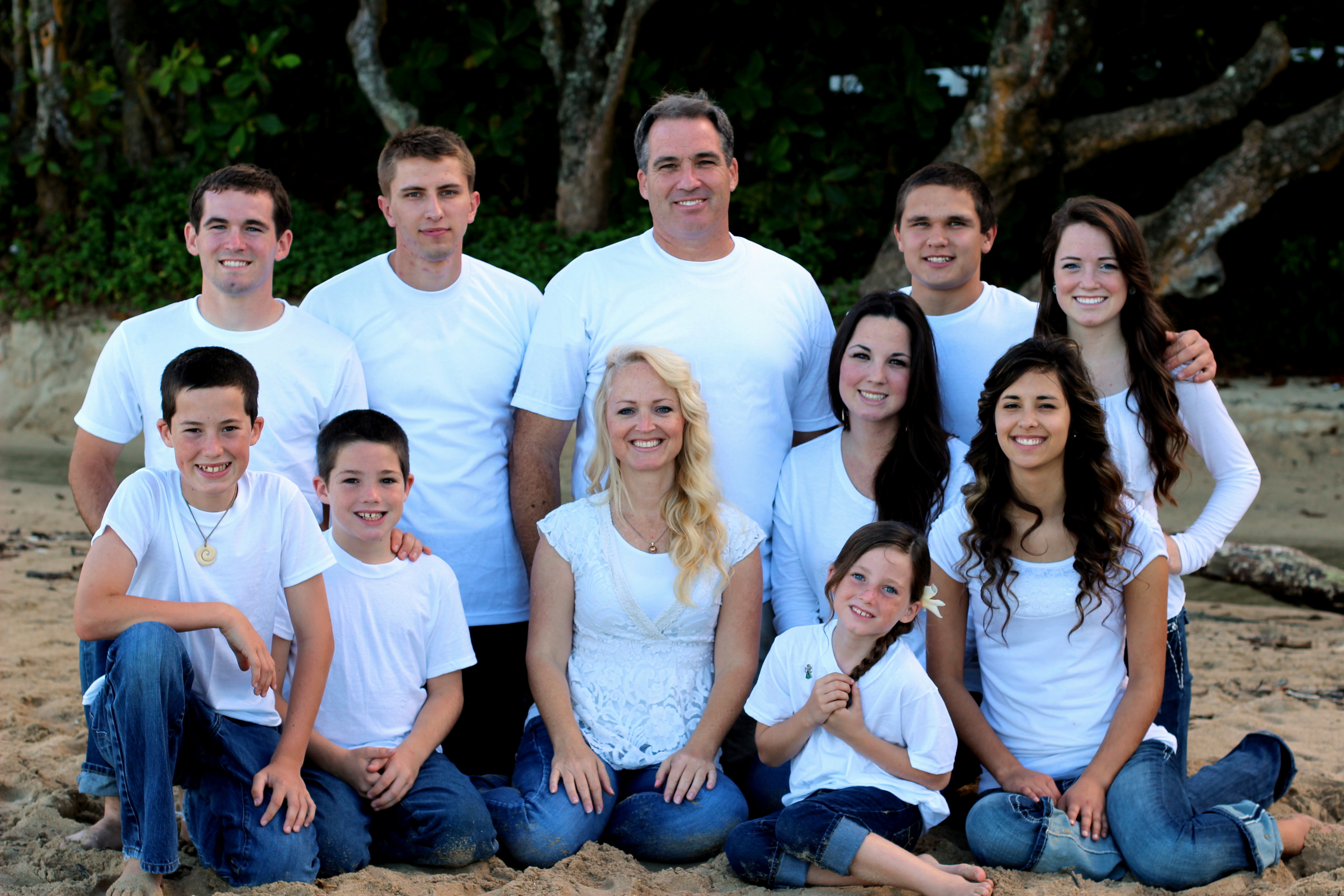
Boyd K. Packer
Elder Boyd K. Packer of the Quorum of the Twelve Apostles told how he learned the “after you” lesson:
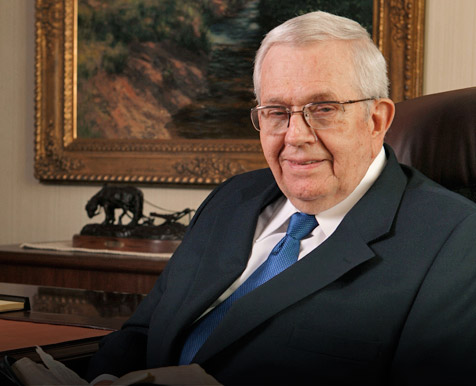
“Some years ago I learned a lesson that I shall never forget.
“I had been called as an Assistant to the Council of the Twelve, and we were to move to Salt Lake City and find an adequate and permanent home. President Henry D. Moyle assigned someone to help us.
“A home was located that was ideally suited to our needs. Elder Harold B. Lee came and looked it over very carefully and then counseled, ‘By all means, you are to proceed.'”
“But there was no way we could proceed. I had just completed the course work on a doctor’s degree and was writing the dissertation. With the support of my wife and our eight children, all of the resources we could gather over the years had been spent on education.
“By borrowing on our insurance, gathering every resource, we could barely get into the house, without sufficient left to even make the first monthly payment.
Brother Lee insisted, ‘Go ahead. I know it is right.’
“I was in deep turmoil because I had been counseled to do something I had never done before-to sign a contract without having the resources to meet the payments.
“…I was still not at peace, and then came the lesson. Elder Lee said, ‘Do you know what is wrong with you-you always want to see the end from the beginning.’
“I replied quietly that I wanted to see at least a few steps ahead. He answered by quoting from the sixth verse of the twelfth chapter of Ether: ‘Wherefore, dispute not because ye see not, for ye receive no witness until after the trial of your faith.’
“And then he added, ‘My boy, you must learn to walk to the edge of the light, and perhaps a few steps into the darkness, and you will find that the light will appear and move ahead of you.’
“And so it has-but only as we walked to the edge of the light.
“…I am confident that as we move to the edge of the light, like the cloud that led the Israelites, or like the star that led the wise men, the light will move ahead of us and we can do this work.” (The Holy Temple, pp. 184-86)
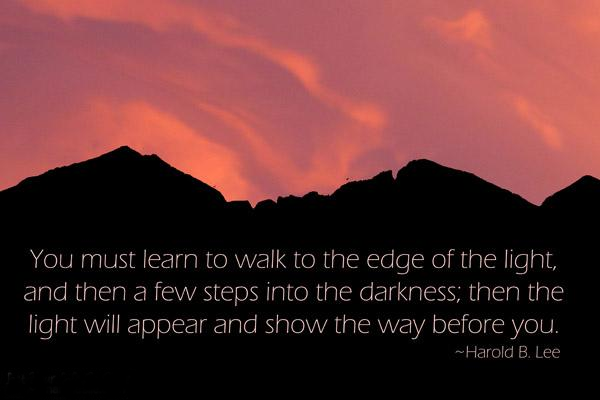
A couple of our own experiences with this principle
My wife and I have seen this same principle in operation throughout our lives. May I share a couple of stories?
When we were newly married, we lived in a small trailer in Provo, Utah, while I attended school at Brigham Young University. We were a couple of miles from campus. Virginia worked on campus while expecting our first child. At one point our car broke down. We took it to a nearby shop for repairs but couldn’t retrieve it until we paid the $30 repair bill. We did have just $30 in the bank, but we owed that same amount in tithing.
We had a decision to make. It was winter, and it would be hard for Virginia to walk two miles in the snow in her condition, risking falling on the ice. Wouldn’t the Lord take an IOU on the tithing and let us pay the car repair bill first? Perhaps He would have. But we’ll be forever grateful that we decided to trust him and pay the tithing first.
The very next day a check came in the mail for $30 from a farmer for whom I had hauled hay the preceding summer and who had not been able to pay me the last of what he owed me. He knew nothing of our present circumstances. He explained that he couldn’t pay me everything he owed, but here was $30. I never heard from him again. But to us this was a dramatic confirmation that if we will take the first step in trusting the Lord, He indeed is ready to take the next step.
We relearned the same lesson about six years later when our oldest son, David, only 13 months old, contracted a case of staph pneumonia. It followed the chicken pox and went undiagnosed until nearly too late. In those days there was very little with which to treat staph pneumonia. It was often fatal. For many days David was in the hospital, with a temperature around 106 much of the time. He was so sick he didn’t even recognize us. The doctors told us that they were not at all sure he would make it. We began daily fasts on his behalf, eating only once a day and praying with all the energy we could muster.
Initially our prayers were rather limited to asking the Lord to heal him. But the turning point was when we were finally able to tell the Lord, in all sincerity, that we were willing for His will to be done. David was our only son at that point, after four sweet girls. We naturally wanted very much for him to survive. So did the Lord. But He wanted first for us to grow from passing a test of our faith. He wanted us to desire that God’s will be done more than our own. When we finally reached that point, David began a miraculous recovery.
Some, when introduced to the gospel say in effect: “Lord, if you will prove to me that this message is true, I’ll join your church.” But Jesus said, “If any man will [first] do [God’s] will, he shall know of the doctrine, whether it be of God or whether I speak of myself.”
Others wait until they are in serious trouble, then say: “Lord, if you’ll get me out of this mess, I’ll shape up and go back to church.” The Lord in His wisdom says: “After you.”
The purpose of trials and testing is far more than to serve as a prerequisite to “earning” the blessings we seek. We can never fully “earn” them, of course. But we can “qualify” for them. The major reason the Lord wants us to take the first step when seeking His blessings is that we thereby grow and develop a celestial character. God’s plan for us is far more than to give us earthly niceties in return for our casual obedience. Rather, it is to help us grow to become someday like Him. [See 1 John 3:2.] We achieve that growth when, and only when, we learn to trust God enough to take a step into the darkness. We then find that though we receive no witness until after the trial of our faith, after that trial the witness and blessings beyond measure invariably come, in the Lord’s due time.
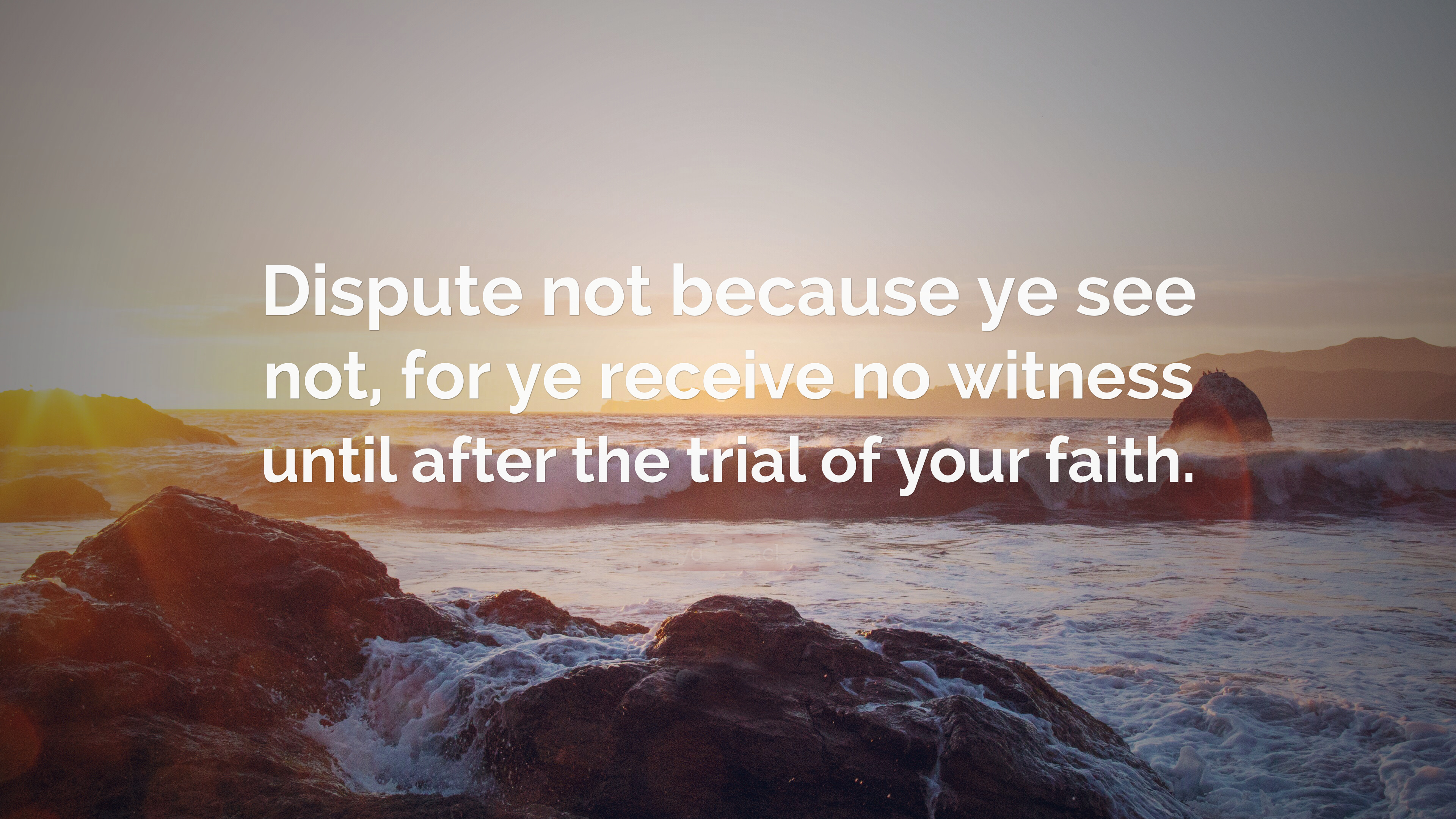

Fantastic, as usual, Don. Thanks so much.